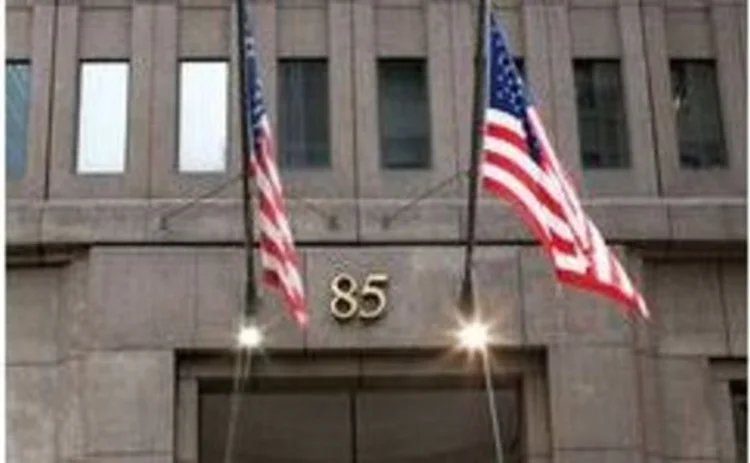
Goldman halted market-making on YRC after empty creditor claim

Goldman Sachs stopped making markets in bonds and credit default swaps (CDSs) on US freight company YRC Trucking for around two weeks from December 16, as part of an effort to stave off a public relations catastrophe. The decision to stop quoting on YRC is understood to have been taken at a very senior level in Goldman, after freight union International Brotherhood of Teamsters (IBT) sent letters to congressmen, senators and state attorneys-general accusing the bank of encouraging investors to torpedo YRC's restructuring - which would have threatened the jobs of around 30,000 IBT members.
Goldman quickly threw its weight behind efforts to help the company stay on its feet, sourcing additional bonds for investors that wanted to vote in favour of the restructuring, which subsequently went through successfully. The story made the pages of the tabloid New York Post on January 9, which declared Teamsters boss James Hoffa had "stared down Goldman Sachs and the big-money crowd on Wall Street and come out a winner". But the episode has also sparked concern that failing companies could use political pressure to strong-arm banks and investors into backing restructurings.
YRC is the first case in which allegations of so-called ‘empty creditor' behaviour have gone public, although disquiet has been growing over the past 12 months (Risk August 2009, pages 33-35). In theory, an investor that buys bond-plus-CDS packages in a distressed company is incentivised to see the company fail - the CDS would trigger and the investor would get paid at par on bonds bought cheaply - but critics have yet to catch empty creditors in the act.
According to IBT, that changed when the union obtained screenshots of a Bloomberg run sent by a Goldman trader on December 16, quoting prices on three YRC bonds and - on the same screen - CDSs in the trucking company. This was, they argued, proof the bank was encouraging empty creditors to build basis packages in YRC with the aim of killing the company. A Goldman spokesman was quoted in reports later that day claiming the bank "does not have a position in the company, nor are we making markets in the company's bonds or credit default swaps".
Was the bank lying? Strictly speaking, no - it is understood Goldman had shut down its market-making in YRC that day, before the spokesman talked to the press.
More importantly, perhaps, was Goldman genuinely encouraging investors to obstruct the YRC restructuring? The head of credit trading at another US bank says it's not fair to draw that conclusion from the screenshot, which shows two-way prices in YRC bonds and YRC CDSs, but doesn't show a price in the two combined. In the current, charged political environment, however, these nuances may not cut much ice. As a source at Goldman concedes: "When Teamsters are sending letters to get congressmen involved, it does become more of a reputational issue than it would otherwise have been."
Having renegotiated bank lending agreements in October 2009 with the aid of IBT, YRC announced its intent to exchange three classes of notes with a face value of $536.8 million for common stock. To win approval, 95% of YRC's bondholders - including investors in a batch of 8.5% notes maturing in April 2010 - had to tender their bonds for the exchange. By the first deadline on December 7, nearly three-quarters of holders across all classes had tendered, but only 29% of investors within the 8.5% class had accepted. After the deadline was extended for a week, acceptance by holders of the 8.5% bonds had crept up to 35%.
"The 8.5% bonds were coming due next, and bondholders may have been waiting for a better deal. But we knew there were new investors trying to profit on a default, as half a dozen anonymous tips came in telling us entities were making markets in CDS packages on YRC," says Iain Gold, director of strategic research at IBT in Washington, DC. "We made it clear we would hold people accountable and they should factor into their decision process they could put 30,000 people out of work if the exchange failed."
By December 23, two more deadlines had passed. Although IBT managed to get YRC's lenders to agree to a lower threshold for tenders, it still wasn't enough: the 8.5% tenders only rose to 53%.
YRC's prospects were given a shot in the arm, however, by its letter-writing campaign. "Goldman was backed into a corner from a public relations standpoint," says Gold.
The bank subsequently tried to put more bonds in the hands of investors that supported the restructuring and, by December 30, the tenders received for the 8.5% class had leapt to 70% - just above the lowered threshold, enabling the exchange to proceed. This hasn't stopped IBT from crusading against empty creditors though. The union is lobbying for stiffer regulation of CDSs and is also considering a lawsuit against Goldman Sachs.
However, the extent to which empty creditors played a part in the YRC story remains unclear. There is no information on the proportion of the stubborn 8.5% note-holders that also owned CDSs on YRC. Moreover, one London-based credit trader says it would make least sense to buy the 8.5% class as part of a basis package, as it was 14.5 basis points more expensive than the next bond to mature. "You could buy the 2010 bond, but why would you? The price is much higher," she says.
There are other concerns too: the tenders from 8.5% bondholders accelerated in line with the media and political campaign against Goldman. As a result, some argue IBT and YRC were able to influence the market far more successfully than empty creditors did - a strategy other distressed companies may now be tempted to follow.
"The fact the union said Goldman is offering basis packages is direct proof Teamsters was influencing the market in my opinion - it pressurised Goldman into doing its bidding. It's the opposite of the empty creditor argument," says the credit trading head.
Only users who have a paid subscription or are part of a corporate subscription are able to print or copy content.
To access these options, along with all other subscription benefits, please contact info@risk.net or view our subscription options here: http://subscriptions.risk.net/subscribe
You are currently unable to print this content. Please contact info@risk.net to find out more.
You are currently unable to copy this content. Please contact info@risk.net to find out more.
Copyright Infopro Digital Limited. All rights reserved.
As outlined in our terms and conditions, https://www.infopro-digital.com/terms-and-conditions/subscriptions/ (point 2.4), printing is limited to a single copy.
If you would like to purchase additional rights please email info@risk.net
Copyright Infopro Digital Limited. All rights reserved.
You may share this content using our article tools. As outlined in our terms and conditions, https://www.infopro-digital.com/terms-and-conditions/subscriptions/ (clause 2.4), an Authorised User may only make one copy of the materials for their own personal use. You must also comply with the restrictions in clause 2.5.
If you would like to purchase additional rights please email info@risk.net
More on Credit markets
Liquidnet sees electronic future for grey bond trading
TP Icap’s grey market bond trading unit has more than doubled transactions in the first quarter of 2024
Single-name CDS trading bounces back
Volumes are up as Covid-driven support fuels opportunity for traders and investors
Podcast: Richard Martin on improving credit migration models
Star quant proposes a new model for predicting changes in bond ratings
CME to pass on Ice CDS administration charges
Clearing house to hike CDS index trade fees from July after Ice’s determinations committee takeover
Buy side fuels boom in single-name CDS clearing
Ice single-name CDS volumes double year on year following switch to semi-annual rolls
Ice to clear single-name bank CDSs from April 10
US participants will be able to start clearing CDSs referencing Ice clearing members
iHeart CDS saga sparks debate over credit rules
Trigger decision highlights product's weaknesses, warns Milbank’s Williams
TLAC-driven CDS index change tipped for September
UK and Swiss bank Holdco CDSs likely inclusions in next iTraxx index roll, say strategists







